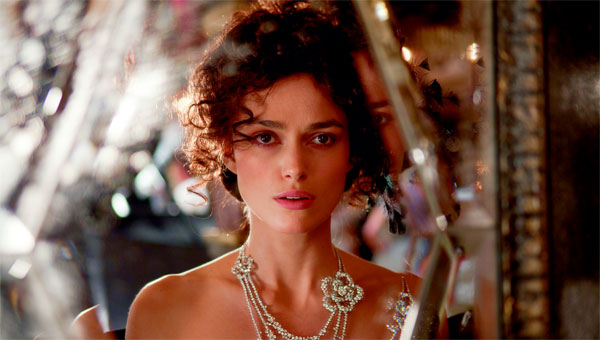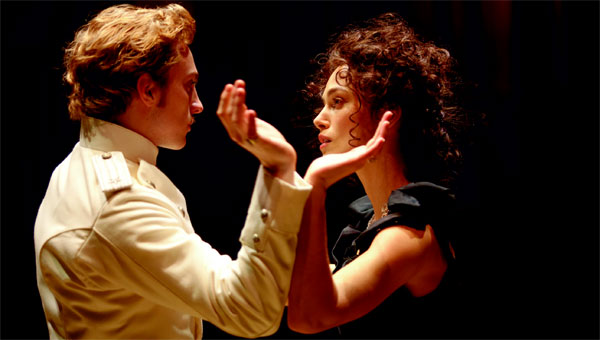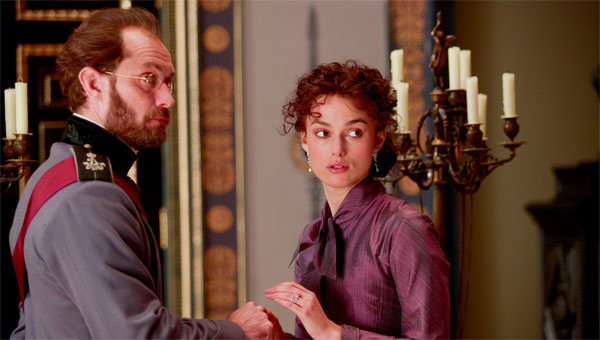Anna Karenina Review

The whole world’s a stage, never more so than in Joe Wright’s vision of Anna Karenina.
The Atonement director’s adaptation of this classic Tolstoy novel begins, like so many other great stories, with a boy and a girl.
Only this boy is a middle aged, married man of substance, while the girl is his children’s nanny.
Vaguely repentant about his infidelity or sins, this un-charming man convinces his sister Anna to come and visit him to counsel his distraught wife.
Being the good sister that she is, Anna toddles off from her own husband and family to try and mend her brother’s ailing one.
As is often the way, the wronged woman is told to forgive and forget the failed fidelity of her husband in the name of love, conveniently forgetting the absence of love from the man, and all seems to be swell again.
And when things are swell in 19th century Russia, you celebrate with a lavish ball.
Married to the brilliant and generous Alexei Karenin, Anna doesn’t haven’t any real problems; but then neither does she like she’s really living life.
So when the dashing cavalry officer and ladies’ man Count Vronsky catches Anna’s eye during the ball, she can’t help but feel more alive.
Or even just alive.

Having offered some bad advice to her sister in law about marriage vows, Anna’s now faced with her own marital dilemma; betray her kind and loving husband Alexei or follow her heart and fall into the arms of the dashing young Vronsky who’s striving so hard to win her favour.
Having never read Tolstoy’s iconic text, I came into this incarnation of his classic novel rather cold; but I’d already been seduced by the stunning costumes and colourful scenery on display.
And that’s the first thing you notice about Anna Karenina, the stunning production values and attention to detail.
Opening on a stage, Wright’s film takes many a theatrical liberty; so scenery is often picked up and moved along or even changed as characters get lost in their own head space and follow their own narrative paths.
Which might sound a little grating, but this is executed so well that it only serves to enhance the charm of the film.
But what Anna Karenina is really all about is one, un-simple thing: love. And we get to feel the many different faces of love as the variety of players on stage experience it for themselves.

So there’s desire, of course, and inevitable rejection. There’s the thrill of the game, the chase in making someone else yours as the bold Vronsky sets out to seduce every new, young filly he sets his eyes upon.
There’s the elation and joy that a woman feels when she has the man she really wants in the palm of her hand, yet the role of the spurned partner is never undersold.
And, through all these things, I felt everything; such is the blessed curse of having experienced all these emotions myself.
The all-star ensemble cast are collectively great in their respective roles; Keira Knightley’s convincingly fragile as Tolstoy’s titular character of Anna, Jude Law’s withdrawn and reserved as her elder husband Alexei whilst Aaron Taylor-Johnson is suave and sure as the old school playboy Count Vronsky.
I couldn’t say how faithful Anna Karenina is to Tolstoy’s original, but it’s such an engrossing character piece I wouldn’t care either.
After so many disappointing big budget films this year, it was a pleasure to watch something where the storyline lives up the expensive visuals on show.
Because even though the world is a stage, it doesn’t make for much entertainment if you don’t have something real to build this on.
Jonathan Campbell